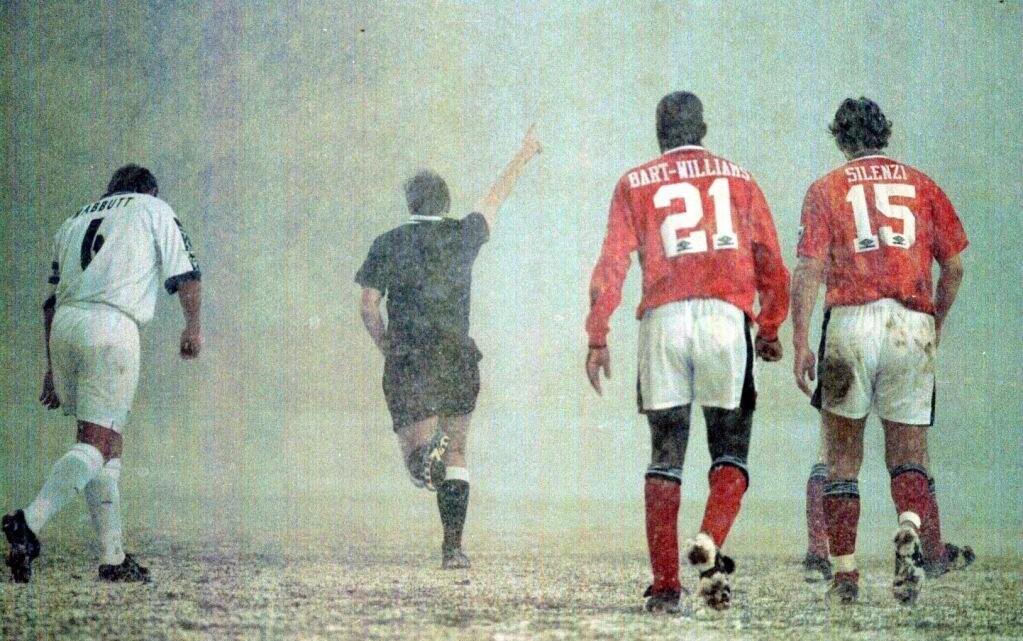Roberto Di Matteo, Fabrizio Ravanelli, Gianluca Vialli and Gianfranco Zola – a who’s who of Italians that have left an indelible mark on the English game. It would be understandable to think one of these players holds the distinction of being the first Italian footballer to play in the Premier League. However, you would be mistaken, for that honour belongs to Andrea Silenzi.
Born in Rome, the striker known as Pennellone (Big Brush) due to his 6ft 3in stance, bandied around Italy’s lower leagues at the start of his career before moving to third-tier side AC Reggiana in 1988 aged just 22. The 1988/89 season was a fruitful one for Silenzi, his nine league goals helping the club win promotion to Serie B.
Silenzi lit the blue touch paper in the 1989/90 season, becoming top goal scorer with 23 goals in 38 games, thus catapulting Reggiana to seventh place in their first season back in Serie B. His lethal form caught the attention of Serie A clubs, earning him a high profile move to Napoli in the summer of 1990.
Unfortunately, in a team full of talents such as Diego Maradona, Careca and Gianfranco Zola, it was hard for Silenzi to make an impact. Unsurprisingly, he was sold to Torino after just two seasons. Being drafted in as Gianluigi Lentini’s replacement meant he had big shoes to fill. The popular winger’s departure to Milan for a world record fee caused fury among Torino’s fans and expectations of Silenzi were high. However, a return of just three goals in his first season as the team finished ninth left a lot to be desired.
Despite underwhelming in the league, Silenzi more than made up for it in the second leg of the Coppa Italia final against AC Milan. His two goals powered II Granata to the win and boosted his popularity with the fans. Silenzi channelled that success to maximum effect in the 1993/94 campaign, scoring 17 league goals – the third highest in Serie A – and earned a call up to the Italian national team.
The 1994/95 campaign wasn’t as successful, yielding just four league goals, yet interest surfaced from England. In the summer of 1995, that interest turned into action, as Nottingham Forest manager Frank Clark parted with a sizable £1.8m for the Italian.
He was seen by Clark as an ideal replacement for Stan Collymore who had just moved to Liverpool. Forest hoped Silenzi’s physical frame would enable him to get on the end of crosses and draw opponents with his hold up play, creating space for his attacking teammates.
Forest believed they had pulled off a coup, signing a player in his prime who had performed in arguably the best league in the world. Being the first Italian to play in the Premier League was a milestone, but also brought pressure as fans expected him to live up to his £30,000 per month wages.
Alas, his below par performances soon shattered the hopes of the fan. The striker made just 10 appearances during the 1995/96 season and failed to score in the Premier League. The only tangible successes were a goal apiece in the FA Cup against Oxford United and the League Cup against Bradford City.
It didn’t take long for Clark to sour on Silenzi, dispatching the forward to Venezia on loan at the start of the 1996/97 season. His loan spell yielded a mediocre four goals in 26 appearances. It was a far cry from just a few years before when he lit up Serie A and was in the running for a spot in Italy’s 1994 World Cup squad. The final nail in the coffin of his Forest career came when he allegedly refused to return at the end of his loan spell and his contract was torn up.
So why did Silenzi fail at Nottingham Forest? Injuries played a role, but not being able to settle in England was the main problem. Nottingham is different to Turin or Naples when it comes to culture, language and customs. In addition, football clubs in England at the time lacked player liaison departments, an integral resource in today’s game in helping foreign players and their families to settle into a new environment. Even with this support, foreign players can find it hard to acclimatise in England – see Andrea Ranocchia’s spell at Hull City in 2017.
As Ranocchia lamented: “I do struggle with the language and driving on the ‘wrong’ side of the road was a problem. On the first day alone I went into the wrong way down two crossings. I’ve already scraped the rims on my car wheels on the pavements. I will admit, I’ve been here for a month and a half, but I am yet to see the sun. It rains practically every day. I really miss pasta, too,”
Difficulties in settling into a new country or injury problems can severely debilitate a player’s confidence. Those setbacks can manifest on the training ground or on match day whether it’s lacking enthusiasm or putting in substandard performances. Silenzi found it difficult to get his career back on track after leaving Nottingham Forest. The striker had unsuccessful spells back at Reggiana and Torino before ending his career in 2001 at Serie B side Ravenna.
Silenzi may have been a flop at Nottingham Forest, but he broke the mould in becoming the first Italian player in the Premier League. It was truly a seminal moment that paved the way for other Italians such as Ravanelli, Vialli and Zola. With their success, the bond between Italian footballers and English football we have today was cemented.
Words by Yousef Teclab: @yousef_teclab

